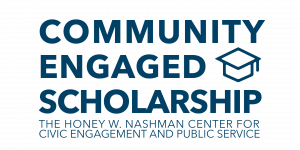Students in PT 8311: Foundations of Examination taught by Dr. Rebecca Pinkus partner with organizations like the Foggy Bottom West End Village to conduct community mobility screenings for older adults.
In this course, Doctor of Physical Therapy (DPT) students participate in community mobility screenings in partnership with the Foggy Bottom West End Village, an aging-in-place community organization. Students apply their classroom learning to conduct various assessments for older adults, including tests for fall risk, cardiovascular endurance, balance, frailty, and other aspects of health crucial for healthy aging. This community engagement project provides an invaluable opportunity for DPT students to bridge theoretical knowledge with practical application while simultaneously contributing to the health and well-being of the Foggy Bottom community. The experience not only enhances students' clinical skills but also develops their communication abilities and reinforces the importance of community health initiatives in physical therapy practice.
The screenings serve multiple purposes:
1. Providing valuable health information to community members
2. Offering students hands-on experience with patient interaction and assessment
3. Contributing to community health awareness and fall prevention efforts
Students work in small teams to administer tests and measures, interpret results, and communicate findings to participants in lay terms. This experience allowed them to practice skills such as taking blood pressure, measuring heart rate, using goniometry, and conducting standardized mobility tests like the Timed Up and Go (TUG).
For information about Community Engaged Scholarship at GW: https://go.gwu.edu/cesc
Semester Reports
Fall 2024
Students Reporting: 14
Time Reported: 60
Community Partners
This semester, students in PT 8311 participated in a Community Mobility Day, conducting mobility screenings for members of the Foggy Bottom West End Village, a local organization supporting older adults in the neighborhood.
Student Comments:
"This experience was valuable for me. Before this day, I had only had the opportunity to practice my skills on my peers. Through this opportunity, I was able to briefly practice my skills on actual community members and apply what I had learned in class to a real-life scenario."
"I, along with several other student physical therapists and one licensed physical therapist, provided functional mobility screens to residents who reside in the Foggy Bottom West End community. This functional mobility screen provided individual residents with information about their current mobility status."
"I learned how to professionally communicate with others in my community and how to provide short cues to improve the success of a physical activity."
"I learned that working with those within your immediate community, at least within the area you live, is an important activity to practice. I've learned that a lot of people in the community are very trusting of those in our position, and are always seeking help. It only takes a few people to be that help in the community."
"Through this Mobility Screen opportunity, I was able to, for the first time, apply the knowledge I learned from class and actually apply it to real-world situations and interact with actual patients. I learned that not all patients are the same and each individual has their own values and needs, so it's important to be adaptable to tailor to each patient's needs."
Spring, 2024
Students Reporting: 9
Time Reported: 30 hours
Student Comments:
"I learned more about adaptive sports and how important it is to have a space for all athletes. I also got the opportunity to try some drills and attempt to play WC Tennis."
"It was quite eye opening to sit in a WC for 4 hours straight. I knew this sport was hard, but actually playing and trying to propel at the same time was extremely difficult. This experience motivated me to play again sometime and volunteer again with this group!"
"I learned about how to appropriately aid individuals with a disability and identified BSF impairments they may have and how to adapt to those. Got insight on different types of wheelchairs and how to put them together, as well as learning where to give assistance when helping individuals into the different types of wheelchairs."


